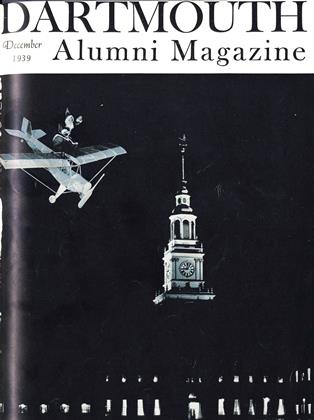CELEBRATING ITS 100th anniversary and its status as the oldest college newspaper in America, The Dartmouth published a 14-page anniversary issue on November 15, and further observed the occasion by gathering together many of its past and present staff members for a banquet a few days later.
One hundred years ago, in November, 1839, The Dartmouth had its genesis in a little monthly publication of the same name. The continuity in title is the basis for the publication's claim to being the oldest college paper in the country. The first issue, filled mostly with heavy essays, is notable now for the inclusion of the poem "Lexington" by Oliver Wendell Holmes, then a member of the Dartmouth faculty. Resemblance to the present student daily rests only in an editorial, a lecture review, and a half-page of college news. The prospectus promised much literary material and "a monthly register of such news as may be interesting to those in any wise connected with us."
The Dartmouth thrived for five years and then suspended, to be resumed in 1867 as a fortnightly publication. News coverage grew in importance, and by 1875, when The Dartmouth became a weekly, the literary side had definitely become subordinate. The paper appeared weekly or biweekly until 1907, when it began to be issued twice a week. In 1910 publication was increased to three times a week, and in 1920 The Dartmouth assumed its present organization as a daily. Today it is one of the few college papers in the country carrying Associated Press news, and serves as the only local daily for the Hanover area.
EDITORIAL FREEDOM
Controversies such as last year's, in which the student paper waged a successful fight against the proposal to place it under the control of an alumni trustee, have been an integral part of the publication's long career. As early as 1876 the student editors suspended publication for the better part of a year, protesting against faculty censorship and declaring that an undergraduate publication that did not honestly express undergraduate opinion had no right to exist. Today The Dartmouth enjoys complete editorial freedom under an 11-man board of proprietors, seven of.whom are undergraduate officers of the paper.
The Dartmouth has had a notable hand in making undergraduate opinion articulate and in influencing developments within the College. It helped introduce rugby football to the Dartmouth campus in 1878—a move which it regretted four years later after an overwhelming defeat by Harvard—and its editorial query as to what could be done during the winter season brought forth in 1910 the movement which led to the founding of the Dartmouth Outing Club, now the College's most distinctive undergraduate activity. The special report of a student committee, headed by Editor William H. Cowley '24, now president of Hamilton College, had great influence in the creation of the modern liberal arts curriculum at Dartmouth.
Some of the College's most distinguished alumni were once editors of The Dartmouth, among them President Hopkins, President Cowley of Hamilton, and Roswell Magill '16, law professor at Columbia and former Under Secretary of the Treasury. Richard Hovey, Dartmouth's poet laureate, was also editor when in college in 1885.
Under the organization adopted last spring, The Dartmouth's 11-man board of proprietors includes seven undergraduate officers from the editorial and business staffs; an undergraduate representative from Palaeopitus; and one representative each from the administration, the faculty and the alumni. James M. Langley '18, editor of The Concord Monitor, is the present alumni adviser. Editor of The Dartmouth this year and one of the most able and respected for many years is Thomas W. Braden '40 of Dubuque, lowa.
 View Full Issue
View Full Issue
More From This Issue
-
 Sports
SportsBig Little Green Team
December 1939 By BILL CUNNINGHAM '19 -
 Article
ArticleHe Makes Students Think
December 1939 By HERBERT F. WEST '22, ERIC P. KELLY '06 -
 Article
ArticleA Landmark Is Gone
December 1939 By WILLIAM A. ROBINSON, Robert Lincoln O'brien '91 -
 Article
ArticleGRADUS AD PARNASSUM
December 1939 -
 Class Notes
Class Notes1931*
December 1939 By CHARLES S. MCALLISTER, CRAIG THORNE JR. -
 Sports
SportsBig Green Teams
December 1939 By Whitey Fuller '37
C. E. W.
Article
-
 Article
ArticleDARTMOUTH CLUB OF BOSTON HOLDS LUNCHEONS IN CITY CLUB
February 1921 -
 Article
ArticleFinancial Report of Athletic Council
October 1938 -
 Article
ArticleDisaster
FEBRUARY 1968 -
 Article
ArticleDan'l Adams, 1797
March 1950 By DAVID E. ADAMS '13 -
 Article
ArticleDARTMOUTH AND THE SECONDARY SCHOOLS
February 1916 By James L. McConanghy -
 Article
ArticleOf Buses and Bells
May 1998 By Noel Perrin







